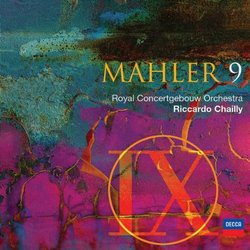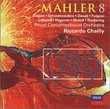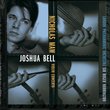| All Artists: Gustav Mahler, Riccardo Chailly, Royal Concertgebouw Orchestra Title: Mahler: Symphony No. 9 Members Wishing: 0 Total Copies: 0 Label: Decca Import Release Date: 11/9/2004 Album Type: Import Genre: Classical Style: Symphonies Number of Discs: 2 SwapaCD Credits: 2 UPC: 028947563105 |
Search - Gustav Mahler, Riccardo Chailly, Royal Concertgebouw Orchestra :: Mahler: Symphony No. 9
 | Gustav Mahler, Riccardo Chailly, Royal Concertgebouw Orchestra Mahler: Symphony No. 9 Genre: Classical
No Description Available. Genre: Classical Music Media Format: Compact Disk Rating: Release Date: 9-NOV-2004 |
Larger Image |
CD DetailsSynopsis
Product Description No Description Available. Genre: Classical Music Media Format: Compact Disk Rating: Release Date: 9-NOV-2004 Similar CDs
Similarly Requested CDs
|
CD ReviewsHighly interesting - but not the greatest ever MartinP | Nijmegen, The Netherlands | 11/28/2004 (5 out of 5 stars) "This recording sets the seal on what is, by any standard, one of the most interesting and artistically coherent Mahler cycles of the last two decades. It seems unthinkable to accord it anything but the highest rating, which it fully deserves. Yet this rendition of the score is not uncontroversial. The choice of tempi, for instance, is at times self-indulgent to say the least. The first movement's opening is nothing near andante commodo - in Chailly's hands, it becomes a full-blown adagio. But later the pulse quickens, and the overall timing of the movement is similar to that in other recordings. Tension never sags; the meticulous attention to dynamics and accents that we've come to expect from this source captures the attention from first to last, by bringing out unfamiliar details. With the centre of the action ricocheting through the orchestra like that, the music becomes supercharged with nervous energy. The ubiquitous manic string figuration is audible nearly all the time. This recording does not offer a serene or world-wary Ninth: the score sounds strikingly aggressive, more than occasionally hinting at the sound world of the Fifth, but also pointing beyond Mahler's own time. Chailly's approach pays its biggest dividends in the middle movements. The Scherzo, with Concertgebouw bassoons and horns in full fling, is nothing short of perfect. The mind-blowing rendition of the Rondo-Burleske is probably the greatest tribute ever paid to Mahler the modernist, and an astounding feat of orchestral virtuosity. Even the sonorous opening of the final Adagio holds a surprise - is that a wrong note we hear? No: it's Fb grinding against F natural in the divided cello's, a sour note at the basis of the glorious string tune that is glossed over by most conductors, but relished by Chailly. The rest of the movement, played by this Rolls Royce of an orchestra, is of course stunningly beautiful - but not quite as emotionally draining as it can be. It's all just a tad too plush and too secure for that. I was put in mind of the recording of Stravinsky's Apollo from this team, where the essential austerity of the music gets similarly lost in the lushly beautiful, thick string-tone. Here, too, the sense of fragility and mystery, that sets apart the very greatest recordings of this work (first and foremost, still, Zander's), is missing. Technically, the recording is fairly loud and direct, and does not eschew gimmickry, say, to bring the naturally reticent bass clarinet to the fore or to emphasize solo lines. The entry of the death motto at the heart of the first movement may never have been so brutally violent, yet lacks the impact it has in some other recordings because the music before and after it is also highly charged and generally loud. All in all, a very worthwhile addition to any Mahler collection, because it sheds new light on a familiar score, and because the orchestral playing is simply out of this world. Completists who own the rest of the Chailly Mahler cycle will want to get it anyway. But this is not, in my view, the greatest Ninth ever. " Sublime andrew john raiskums | Melbourne, Australia | 11/14/2004 (5 out of 5 stars) "I too was blown away by this recording. Everything about it is exceptional- the tempi, the playing of the orchestra- which is phenomenal in every department, the recorded sound and balances and most importantly Chailly's reading of the symphony- which feels right in every way. I was quite surprised to see that this is amongst the slowest ever versions of the work- the first movement runs over 30 minutes, the last movement is even slower than Zander at 28mins 24secs. The second movement is also more spacious than usual. Chailly must have thought long and hard about his choices of tempo for this work- in the past I've been critical of his tendency to nudge his tempos forward of what's actually printed. The gains from these slower tempi are manifold- has the first movement's first theme ever unfolded with such a heaviness of heart? And have the woodwind solos in the movement's coda ever spoken so eloquently? (what playing!) The central climax of the movement is absolutely shattering- like an apparition of the Angel of Death- with the 'heartbeat' rhythm hammered out in the brass but with those eerie semiquavers in the low woodwinds and strings still well in the texture. I note that in the score Mahler asks for 'tief glocken' in the following section of the work and I think Chailly's is the first recording I've heard that actually uses them- not just tubular bells. Listen to the way these instruments heighten the musics sense of change and revelation. I find that the slightly broader tempo for the second movement brings out its sense of parody and irony more acutely- and listen to how superbly well all those trills, grace notes and turns are played in the opening section. The forward rush of the third movement and all its grotesqueries are relished by the Concertgebouw- but once again, it's the lyrical central section that stays in the mind- with a gloriously played trumpet solo. The strings cover themselves in glory in the last movement and it would be invidious not to mention the first violin and first horn solos- these tug at the heart-strings and 'speak' in a way that only an orchestra such as the Concertgebouw, which is steeped in the Mahler tradition, could do. Chailly's concentration, control and grading of dynamics on the last page of the score, which here runs to nearly four-and-a-half minutes, is amongst the best I've ever heard. I notice that bass lines are regularly dropped down the octave in the last movement- not sure where this tradition comes from- maybe someone could enlighten me?! There are so many good recordings of Mahler's Ninth around- I have always admired Horenstein's dark and uncomprimising view of the work- but I think that it would be fair to say that among modern versions, this one would probably sit right at the top. It is exceptional. " Moves Straight to the Top of the Class David A. Kemp | Plano, TX USA | 07/18/2005 (5 out of 5 stars) "I am in awe of this powerful, moving, impeccably prepared, beautifully crafted performance of Mahler's last completed symphony, and of the magnificent, state-of-the-art sound Decca has provided for it. Chailly's tempos all work; his performance is profound and utterly convincing. The Concertgebouw has Mahler in its bones, and its committed playing and sumptuous sonority are all that could be desired. And Decca's engineers have captured every nuance with unrivaled immediacy, clarity, richness, and impact, revealing countless felicitous details, as well as exceptionally wide frequency range and dynamic range. Soft passages have beguiling delicacy; climaxes have potent bass and gut-wrenching power. The grand scale of the reading is fully conveyed; what we hear here can stand as a model of how to record a Mahler symphony. This recording marks the triumphant conclusion of Chailly's distinguished Concertgebouw Mahler cycle for Decca. It was made in the Concertgebouw Great Hall, famed for its superb acoustics, in June 2004, in conjunction with Chailly's farewell concert as principal conductor of the orchestra (but it is not a live recording).
I've been a Mahler buff for 40 years and have many recordings of his symphonies, including half a dozen Mahler Ninths. But I've never heard a more eloquent Ninth than this one, and I've never heard one in which every thread of the complex orchestration is so clearly revealed. If I could keep only one Mahler Ninth, this would be the one. In addition to Chailly and the Concertgebouw, Decca engineers Jonathan Stokes and Philip Siney deserve to take a bow. Anyone who loves Mahler, anyone fond of the Ninth, anyone curious about how good a recent digital recording of a Mahler symphony can be, ought to hear this recording. Warmly recommended. " |

 Track Listings (1) - Disc #1
Track Listings (1) - Disc #1










